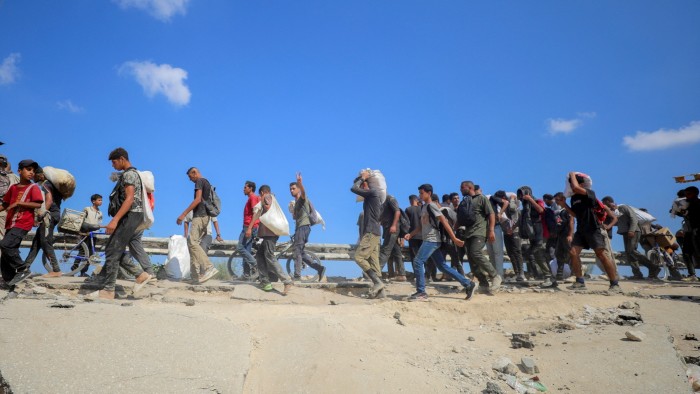Unlock the Editor’s Digest for free
Roula Khalaf, Editor of the FT, selects her favourite stories in this weekly newsletter.
Four Boston Consulting Group staff quit the team advising on a new aid system for Gaza in the early stages of the work, raising concerns about the project months before it spiralled into a reputational crisis for the firm.
The departures have become a focus for investigators looking into what BCG has called process failures surrounding its work for the Gaza Humanitarian Foundation, according to people familiar with the matter. The firm said that the partners leading the project “obfuscated” the reasons the team members left.
BCG worked for seven months to help set up the GHF, an Israeli-backed food distribution scheme that has supplanted the traditional UN-led relief effort in Gaza and attracted international condemnation. BCG bosses shut down the project on the eve of GHF’s launch in May, saying the US partners in charge had dodged formal approval processes and misled their superiors.
People familiar with the early stages of the project said that three US staffers who were picked to work on it decided to walk away just one day after joining. BCG was initially engaged on a pro bono basis last October by Orbis, a US security contractor working with an Israeli think-tank to help design the organisation that became the GHF.
People who spoke to the trio said they had raised concerns about the need for co-ordination with the Israeli authorities, among other qualms.
The work, which BCG codenamed Project Aurora, restarted with a different team drawn from elsewhere in the firm’s US defence practice. One member of that new team quit after just a few weeks working with Orbis, citing discomfort over the use of private security contractors with military backgrounds and doubts about the viability of the project, according to people familiar with the matter.
During this early period, the BCG team discussed the reputational risk of working with private security contractors and issues that might arise if GHF failed to attract broad support. They were asked by the lead partner to draw up a list of their concerns, and the consultant, a US military veteran, quit the project shortly after this exercise.
The four early departures and the list of concerns have been examined by the law firm WilmerHale, which was brought in by BCG to investigate Project Aurora, and its lawyers have asked questions about whether the issues raised were properly addressed.
“Our involvement with the work in Gaza was the result of deliberate individual misconduct, including that the reasons for departures from the team were obfuscated,” BCG said. “We have launched a firm-wide effort to ensure our controls are not circumvented and to strengthen our speak-up culture.”
The GHF has been disavowed by mainstream aid groups for breaching humanitarian principles of independence, and condemned by the UN as a “fig leaf” for Israeli war aims. Its small number of distribution sites have failed to allay fears of starvation in the enclave and hundreds of Palestinians have been killed on their way to pick up food.
BCG says it is committed to being apolitical and upholding humanitarian principles, and that the two partners on the project falsely claimed the GHF had broad multilateral support. The partners did create what they called “guardrails” around the project that included preventing travel into Gaza itself and a promise not to involve BCG staff from the Middle East or Israeli offices, according to people familiar with the matter.
BCG fired the two partners in June, and two senior executives who were aware of the project have also stood down from their managerial roles.
The Financial Times has reported that the BCG team also built a financial model of postwar Gaza for the Israeli businessmen who helped develop the GHF, which estimated the costs and economic impact of relocating hundreds of thousands of Palestinians to other countries, including Somalia.
Several aid groups that have worked with BCG in the past suspended their partnerships pending the outcome of the WilmerHale investigation. Christoph Schweizer, BCG chief executive, said the episode was “deeply painful and profoundly disappointing”.
BCG greenlit multiple projects related to Gaza after the start of the war between Israel and Hamas. One team of consultants worked with Fogbow, a private company founded by US military veterans, and a related charitable foundation that aimed to channel aid to the enclave by sea from Cyprus. The consultancy also pitched UNRWA, the UN agency, on helping it organise its Palestinian relief effort and fundraising, although no work was agreed.
Read the full article here
